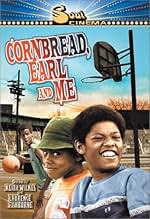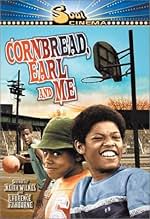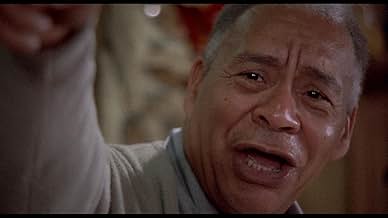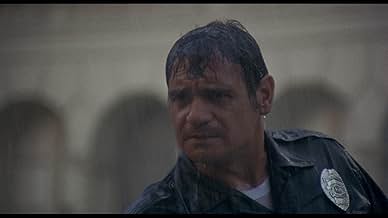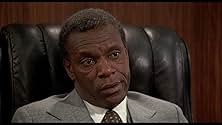IMDb RATING
6.9/10
1.1K
YOUR RATING
A 12-year-old is traumatised by the murder of his friend, a star basketball player.A 12-year-old is traumatised by the murder of his friend, a star basketball player.A 12-year-old is traumatised by the murder of his friend, a star basketball player.
Jamaal Wilkes
- Nathaniel 'Cornbread' Hamilton
- (as Keith Wilkes)
Laurence Fishburne
- Wilford Robinson
- (as Laurence Fishburne III)
- Director
- Writers
- All cast & crew
- Production, box office & more at IMDbPro
Featured reviews
A kid witnesses the shooting death of the neighborhood basketball star. The basketball player had been mistaken by the police as a crime suspect. The kid is subjected to harrassment from the policement involved to keep quiet about what he knows. The cops even go so far as to intimidate his mother. This is an early film appearance of Lawrence Fishburne's. He was thirteen or fourteen when he did this movie. The always magnificent late Rosalind Cash plays his mother. The film makes a sharp comment about the conflicts people have with the very people who are supposed to be protecting them.
Jamaal Wilkes, Laurence Fishburne (in his first big-screen role), and Tierre Turner are shooting hoops when it begins to rain. They go into Charles Lampkin's store, and Wilkes buys treats for the other boys. He's in a good mood, because he's the first in the neighborhood who will go to college, on a football scholarship, and he will be going tomorrow. They start to banter about how fast he is, and he starts to run home in the rain. Police officers, pursuing a suspect, mistake Wilkes. They shoot him dead.
It's Moses Gunn whom Madge Sinclair and Stack Pierce, Wilkes' parent hire to get the Police admit they made a mistake, and it's Rosalind Cash, Fishburne's mother, who nurtures him. Some of the roles, like Stefan Gierasch as the cop who intimidates witnesses, are pretty much stereotypes, but that's the point of this movie: to see the Black people in it as individuals. Despite an occasionally clunky pacing, it does that very well.
It's Moses Gunn whom Madge Sinclair and Stack Pierce, Wilkes' parent hire to get the Police admit they made a mistake, and it's Rosalind Cash, Fishburne's mother, who nurtures him. Some of the roles, like Stefan Gierasch as the cop who intimidates witnesses, are pretty much stereotypes, but that's the point of this movie: to see the Black people in it as individuals. Despite an occasionally clunky pacing, it does that very well.
Seeing that this is one of the first, if not the first, Hollywood movies fully to address the issue of police brutality toward African Americans, a problem that remains unsolved, I am inclined to cut this film a whole lot of slack. I am willing to overlook the Lorraine Hansbury wannabe dialogue and over the top acting, surprising for such a distinguished cast. I will even forgive the bombastic, intrusive music score. Because, however crudely at times, director Joe Manduke conveys the feel of a community oppressed as well as the difficulty of and need to stand up to the oppressor. So that by the end of the film one is both angered and stirred. And not spuriously, either Give it a B minus.
PS...One exception to the general histrionics of the acting is a very young Laurence Fishburne whose testimony at the inquest is, by far, the film's best scene. That it is also the only one without music is not, in my view, coincidental.
PS...One exception to the general histrionics of the acting is a very young Laurence Fishburne whose testimony at the inquest is, by far, the film's best scene. That it is also the only one without music is not, in my view, coincidental.
10Carrj145
I was very disturbed by the negative review given by a man who actually lived during the times dramatize in "Cornbread, Earl and Me." I am a 26-year-old Black female watching this movie for the first time. I found that every issue addressed in this movie is transcendent, relevant even today.
It amazes me that we overlook the importance of a message simply because of the delivery. In all fairness to this movie, there is no blaxploitation present; the language, attire, scenery, etc., everything necessary for a realistic plot, is perfect for the setting and time frame of this movie. Regarding the comment about "ghetto language" there is a balance between the use of the formal and informal in the movie.
As an English teacher, and one who has a strong disdain for negative images of African-Americans, I can honestly say that this movie's depiction of African-American life was very well done. It was also poignant and ahead of its time. It is movie that, when the time comes, I will show to my children as a reference to how very little times have changed regarding the ease of wrongful deaths, slandering of names, harassment of witnesses because of racial advantages, or rather disadvantages.
The movie is GREAT;-)
It amazes me that we overlook the importance of a message simply because of the delivery. In all fairness to this movie, there is no blaxploitation present; the language, attire, scenery, etc., everything necessary for a realistic plot, is perfect for the setting and time frame of this movie. Regarding the comment about "ghetto language" there is a balance between the use of the formal and informal in the movie.
As an English teacher, and one who has a strong disdain for negative images of African-Americans, I can honestly say that this movie's depiction of African-American life was very well done. It was also poignant and ahead of its time. It is movie that, when the time comes, I will show to my children as a reference to how very little times have changed regarding the ease of wrongful deaths, slandering of names, harassment of witnesses because of racial advantages, or rather disadvantages.
The movie is GREAT;-)
Intermittently powerful, all-too-familiar social-problem realism and maudlin melodrama, "Cornbread, Earl and Me" is, either way, a melancholic affair. The overwrought histrionics, overly-optimistic resolution, and some poor acting are especially unfortunate given how moving the best scenes are here. The rainy killing by policemen and subsequent attack on those murderous officers by the neighborhood is a strong scene--ever more shockingly so as it comes after a dull first act. Moreover, it's well foreshadowed by prior unlawful actions by the cops in harassing and unwarranted searching of suspected criminals. The subsequent intimidation of witnesses leading up to the courtroom conclusion is in way familiarly spot on, too, as the police department and city officials close ranks to obstruct justice and protect their own, but it also often veers over-the-top, as does much of the rest of the picture.
Rather surprisingly given that they cast would-be NBA Hall-of-Famer Jamaal Wilkes that the basketball scenes, or single brief montage rather, are scant and unimpressive. It seems evident he wasn't cast for his acting abilities, after all, and is in good company there with other sports legends. (Not everyone is as fortunate as Wilkes's Lakers teammate Kareem Abdul-Jabbar, to be memorably cast in "Airplane!" (1980), and some face the far more reprehensible fate of appearing in a "Space Jam" burger (1996 and 2021).) The gee-wiz simplistic saintliness of Wilkes's "Cornbread" is of eye-rolling annoyance. And, those poor neighbors putting up with his dribbling a basketball in his flat on his way to an athletic scholarship. Either that apartment building was constructed with some of the best in sound-proofing floor and walls or those neighbors are unsung heroes.
Laurence Fishburne also made his debut here, and evidently he could act even as a child, or at least it seems that way by comparison to the actress, Rosalind Cash, playing his mother, who is the most prominent offender here of some very poor, soap-opera levels of acting (and, indeed, Cash's career ended with a role on daytime soap "General Hospital"). They should've cut the candy bar theft scene that results in her ridiculously weeping over her kid stealing 15 cents worth of merchandise. I get the point of the scene--everyone gets the obvious intent of it--to establish Wilford's, the "Me" protagonist of the title, maturing sense of ethics, but there are better ways to accomplish as much without constantly hitting the audience over the head with the cinematic equivalent of a sledge hammer. Perhaps, this is a product of its era, as much of the representation of African Americans on screen was in blaxploitation flicks, so subtlety doesn't seem to have been valued much, but this material was and is still is socially-relevant and powerful enough to do without the dramatic cop-outs.
Rather surprisingly given that they cast would-be NBA Hall-of-Famer Jamaal Wilkes that the basketball scenes, or single brief montage rather, are scant and unimpressive. It seems evident he wasn't cast for his acting abilities, after all, and is in good company there with other sports legends. (Not everyone is as fortunate as Wilkes's Lakers teammate Kareem Abdul-Jabbar, to be memorably cast in "Airplane!" (1980), and some face the far more reprehensible fate of appearing in a "Space Jam" burger (1996 and 2021).) The gee-wiz simplistic saintliness of Wilkes's "Cornbread" is of eye-rolling annoyance. And, those poor neighbors putting up with his dribbling a basketball in his flat on his way to an athletic scholarship. Either that apartment building was constructed with some of the best in sound-proofing floor and walls or those neighbors are unsung heroes.
Laurence Fishburne also made his debut here, and evidently he could act even as a child, or at least it seems that way by comparison to the actress, Rosalind Cash, playing his mother, who is the most prominent offender here of some very poor, soap-opera levels of acting (and, indeed, Cash's career ended with a role on daytime soap "General Hospital"). They should've cut the candy bar theft scene that results in her ridiculously weeping over her kid stealing 15 cents worth of merchandise. I get the point of the scene--everyone gets the obvious intent of it--to establish Wilford's, the "Me" protagonist of the title, maturing sense of ethics, but there are better ways to accomplish as much without constantly hitting the audience over the head with the cinematic equivalent of a sledge hammer. Perhaps, this is a product of its era, as much of the representation of African Americans on screen was in blaxploitation flicks, so subtlety doesn't seem to have been valued much, but this material was and is still is socially-relevant and powerful enough to do without the dramatic cop-outs.
Did you know
- TriviaLaurence Fishburne's film debut. He is credited as Laurence Fishburne III.
- GoofsWhen a clay pot is thrown at Officer Atkins and hits the windshield of his cruiser, it breaks. Pieces of glass hit Atkins and embed in his face. But windshields are made of safety glass and though windshields break, they keep the glass in place. So, the glass in this windshield would NOT have flown at Atkins, let alone embed in his face. He would have come out of this situation shaken but physically unharmed.
- Quotes
Wilford Robinson: ...they killed Cornbread and he wasn't doin' nothin'
[pause]
Wilford Robinson: all he was doin wuz jus goin' home...
- ConnectionsFeatured in Dusk to Dawn Drive-In Trash-o-Rama Show Vol. 2 (1996)
- How long is Cornbread, Earl and Me?Powered by Alexa
Details
- Release date
- Country of origin
- Official site
- Language
- Also known as
- Hit the Open Man
- Filming locations
- Production companies
- See more company credits at IMDbPro
Box office
- Budget
- $800,000 (estimated)
Contribute to this page
Suggest an edit or add missing content


